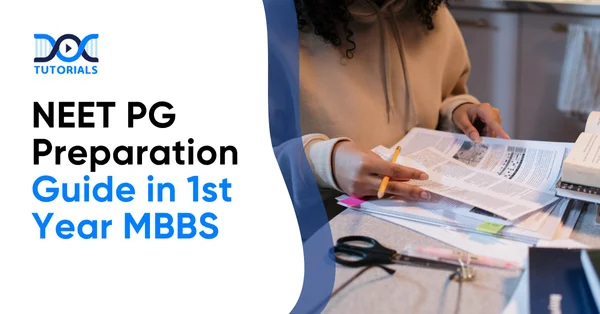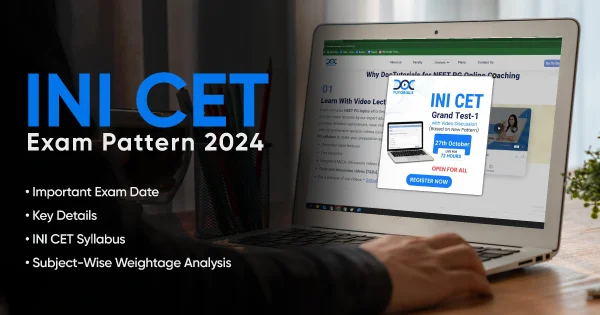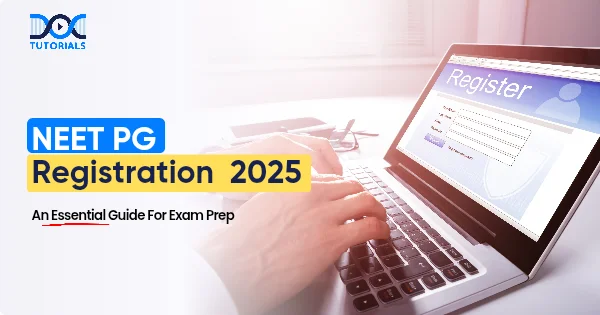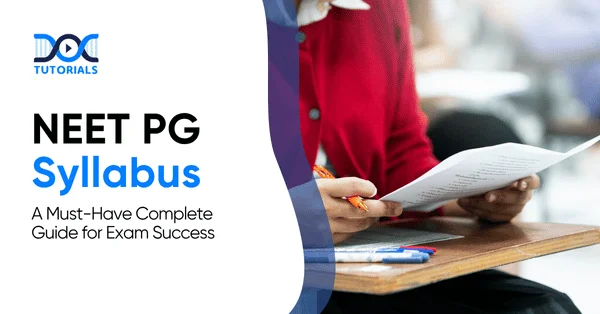NEET PG Preparation Guide in 1st Year MBBS

As soon as you enter MBBS, NEET PG begins to loom over your head — and not without reason. This test determines the course of your medical career and is a key factor in where you’ll pursue your postgraduate training.
In this regard, the biggest question most students ask themselves is, ‘When will I start preparing for NEET PG?’. The time from which you start preparing determines your performance and level of confidence. Starting early helps you to master your subjects well, practise many times, and approach the exam calmly rather than in panic.
This guide walks you through the best time to start your preparation, the right strategies to adopt from your first year, and practical ways to balance MBBS studies with NEET PG goals.
Understanding NEET PG
The National Eligibility cum Entrance Test for Postgraduate (NEET PG) is a national-level exam that opens the gateway to MD, MS, and PG Diploma courses across India. It evaluates all that you have studied in the course of the MBBS, beginning with the basics of Anatomy and Physiology and going all the way up to the ins and outs of Medicine and Surgery.
Exam Overview
- Subject Coverage: NEET PG covers all topics covered in the MBBS curriculum: pre-clinical, para-clinical, and clinical.
- Question Type: The exam is purely in the form of MCQs that examine both factual knowledge and clinical thinking.
- Duration & Marking Scheme: The duration of the paper is 3 hours and 30 minutes. Each correct answer fetches positive marks, while incorrect ones attract negative marking, rewarding precision over guesswork.
NEET PG Preparation Guide
Here’s a complete guide on how to prepare for NEET PG in your first year:
- Understand the Syllabus
- To master NEET PG, you must first understand its structure. The exam covers everything from pre-clinical subjects (Anatomy, Biochemistry) to clinical subjects (Medicine, Surgery, OBG). Each section carries a different weightage, making prioritisation essential.
- Go through past papers to see which subjects are covered more frequently.
- Focus more on Medicine, Surgery, OBG, Pharmacology, and Pathology.
- Divide every subject into smaller, logical subtopics.
- Create micro-goals for daily completion.
- Set Realistic Goals and Milestones
Setting achievable goals gives your preparation direction and helps you stay consistent:
- Divide the Syllabus: Split it into smaller units and assign realistic time blocks.
- Create a Timeline: Plan your preparation in phases — concept building, revision, and testing.
- Evaluate Often: Track your progress through mock scores and topic completion. Adjust your schedule as needed.
- Choose Quality Study Material
Having appropriate study material is half the battle won. Good materials can assist you in understanding concepts more quickly and remembering them.
Recommended Resources
- Standard MBBS Textbooks: Stick to trusted authors — Harrison (Medicine), Bailey and Love (Surgery), Robbins (Pathology), Ganong (Physiology), or Harper (Biochemistry).
- NEET PG-Specific Books: Supplement with concise guides and question banks focused on exam-relevant material.
- Online Platforms: Use e-learning apps like DocTutorials for visual learning and self-paced revision.
- Coaching Institutes: For systemic guidance, take up a good coaching course with mock tests and course subject-wise mentoring.
- Revise Consistently
Revision is not optional — it’s the most crucial part of long-term retention.
Effective Revision Techniques:
- Active Recall: Quiz yourself instead of rereading notes.
- Spaced Repetition: Revisit each topic at gradually increasing intervals to prevent forgetting.
- Frequent Testing: Use quizzes and flashcards to strengthen weak areas.
- Give Mock Tests Regularly
Mock tests are the bridge between preparation and performance.
Why They Matter:
- Performance Analysis: Discover what’s working and what needs fixing.
- Time Management Practice: Learn to allocate time effectively across questions.
- Exam Simulation: Simulate the actual exam environment to build confidence.
Mock Test Tips:
- Begin early — even with subject-wise tests.
- Review every mistake in detail; understand the reasoning behind each question.
- Increase test frequency as you near the actual exam.
- Use College Resources Wisely
- Faculty Mentorship
Your professors are your best academic allies. Ask questions during lectures, seek conceptual clarity, and participate in discussions. The top medical colleges offer sessions, seminars, and workshops that enrich understanding beyond textbooks.
- Peer Learning
Group discussions are invaluable. Explaining concepts to peers or listening to their perspectives strengthens understanding.
- Access to Study Materials
Use your online and college library. Locate journals, research papers, and online databases. These will enhance your theoretical learning and give you a more clinical outlook.
- Assessments and Feedback
Take advantage of institutional mock exams. They reflect the format of NEET PG and provide you with practical insights on how to improve.
Why Starting Early Makes a Real Difference for NEET PG?
Starting early offers several key advantages:
- Shift from Panic to Planning
When you begin preparation early, you shift from a panic-driven mindset to a planned and confident approach. NEET PG is not merely the study of facts; it is a test of clinical judgement, which is a practical skill needed while making diagnoses.
- Strong Foundation Matters
Give attention to base courses – Anatomy, Physiology, and Biochemistry. These are the foundations of all that you will learn in the future. Read textbooks, watch concept videos, and simplify complex issues using visual aids.
- Understand, Don’t Just Memorise
Connect what you learn in MBBS with NEET PG concepts. This integrated approach makes it easier to grasp and retain topics instead of rote learning.
- Consistent MCQ Practice
Begin answering the MCQs with what you already know. Even a little regular practice exercises your brain to recall and comprehend.
- Depth Over Speed
The phase is not about speed or scores but depth and clarity. Whatever you put into it today will be less difficult in the future when you have advanced classes.
- More Time to Revise
Early starters get multiple rounds of revision before the exam. This repetition improves memory, reduces stress, and builds confidence.
- Stay Ahead of the Competition
NEET PG is highly competitive. Early preparation gives you a clear edge — not just through hard work, but by preparing smartly and consistently.
Smart MBBS 1st Year Strategies for NEET PG Preparation
Here are a few tips to excel in your first-year preparation:
- Stick to a consistent routine — combine your daily college studies with NEET PG review sessions.
- Use standard textbooks like BD Chaurasia, Guyton, and Harper’s instead of short notes or summaries.
- Start solving basic MCQs after finishing each topic; even 10 questions a day build strong recall habits.
- Build a strong conceptual understanding of every MBBS subject.
- Practise MCQs regularly to sharpen your speed and accuracy, which are vital for the real exam.
- Manage your study hours and revision cycles. It is just as important as studying itself.
- Take frequent mock tests and self-evaluations to help you identify weaknesses before they cost you marks.
- Avoid cramming; focus on understanding mechanisms. Study daily in small chunks instead of long, exhausting sessions.
- Balance college hours and self-study. Make a timetable with time blocks for theory, revision, and rest. Keep it flexible but consistent.
- Subjects like Anatomy and Physiology thrive on diagrams and flowcharts. Visualising structures and mechanisms helps with both retention and application.
MBBS 1st Year Subject Approach
- Anatomy: Make full use of the dissection hall — nothing replaces real anatomical visualisation. Draw diagrams, trace nerve routes, and correlate them clinically.
- Physiology: Flowcharts are your best friend. Focus on understanding how systems work rather than memorising definitions. Connect every mechanism to a clinical context.
- Biochemistry: Repetition is key. Learn pathways and molecular concepts through visual mnemonics and charts.
FAQs About NEET PG Preparation Guide in 1st Year
- How to prepare for NEET PG in 1 year?
Understand the exam pattern, start early, and create a structured study plan. Focus on reliable study material, revise regularly, and practise MCQs daily. Prioritise high-yield topics, manage time during mock tests, and stay consistent and motivated for steady progress.
- How to avoid silly mistakes in NEET PG?
Solve confident questions first, pay attention to important terms, avoid guesswork, read all options carefully, and revise regularly to strengthen recall and reduce errors.
- How to crack NEET PG in the first attempt?
Study smart, create a balanced schedule, think like an examiner, take regular mock tests, avoid over-studying, stay focused, and choose the best books suited to your learning style.
- How to avoid bubbling mistakes in NEET PG?
Don’t rush; ensure correct question-to-bubble alignment, fully darken each bubble, and double-check the OMR sheet to avoid scanning errors.
- What are the strategies used by NEET PG toppers?
NEET PG toppers follow a realistic daily study plan, focus on high-yield topics, practise PYQs and mock tests, and use one main study resource. They revise regularly, use active recall, analyse weak areas, and maintain consistency. Managing stress and minimising distractions are key to staying motivated throughout preparation.
Conclusion
The first year of MBBS lays the foundation for everything that follows NEET PG. By developing smart, sustainable study habits early on, you set yourself apart from the crowd. MBBS life can feel overwhelming at times. Keep your mind active and positive — pursue hobbies, play sports, or take short breaks to recharge.
If you require more help with your preparation, DocTutorials can be your perfect study partner. It offers animated video lectures, a comprehensive question bank, PYQs, and real-time interactive sessions to help you study effectively, perform well in exams, and strengthen your clinical knowledge.
Find out more about the DocTutorials NEET PG Course today and take a confident leap toward achieving your medical career goals!
Latest Blogs
-

INI CET Exam Pattern 2025: A Complete Guide with Subject-Wise Weightage
The Institute of National Importance Combined Entrance Test (INI CET) is your key to entering some of the most prestigious…
-

NEET PG Registration 2025: An Essential Guide For Exam Prep
The NEET PG registration, which is conducted online, is a crucial step in the exam process. Filling out the NEET…
-

NEET PG Syllabus 2026: A Must-Have Complete Guide for Exam Success
The NEET PG Syllabus acts as one of the foundation stones for aspiring postgraduate medical students like you who are…





